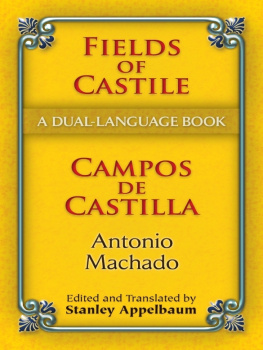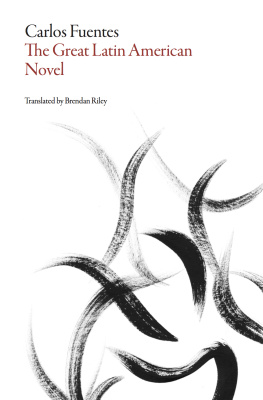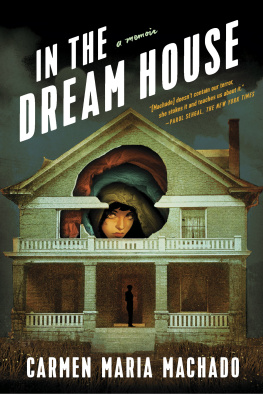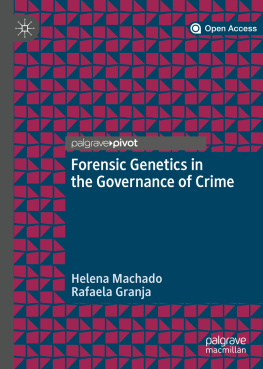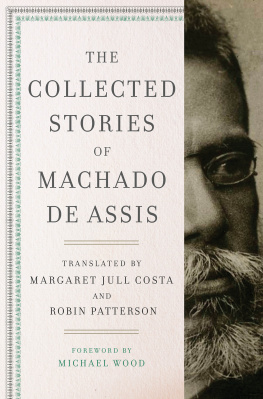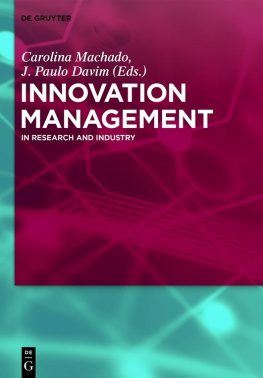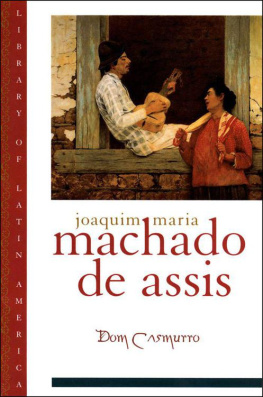Major Figures in Spanish and Latin American Literature and the Arts
Roberto Gonzlez Echevarra, Series Editor
K. David Jackson
Machado de Assis
A Literary Life


Title page photo: Machado de Assis in O lbum (1893). Reproduced by permission of the Instituto Moreira Salles.
Copyright 2015 by K. David Jackson
All rights reserved.
This book may not be reproduced, in whole or in part, including illustrations, in any form (beyond that copying permitted by Sections 107 and 108 of the U.S. Copyright Law and except by reviewers for the public press), without written permission from the publishers.
Yale University Press books may be purchased in quantity for educational, business, or promotional use. For information, please e-mail (U.K. office).
Set in Bulmer type by Westchester Book Group, Danbury, Connecticut.
Printed in the United States of America.
Library of Congress Cataloging-in-Publication Data
Jackson, K. David (Kenneth David)
Machado de Assis : a literary life / K. David Jackson.
pages cm. (Major figures in Spanish and Latin American literature and the arts)
Includes bibliographical references and index.
ISBN 978-0-300-18082-4 (cloth : alk. paper) 1. Machado de Assis, 18391908
Criticism and interpretation. I. Title.
PQ9697.M18Z6665 2015
869.33dc23
2014036996
A catalogue record for this book is available from the British Library.
This paper meets the requirements of ANSI/NISO Z39.48-1992 (Permanence of Paper).
10 9 8 7 6 5 4 3 2 1
Major Figures in Spanish and Latin American Literature and the Arts will publish comprehensive books on canonical authors and artists from any period, adhering to a variety of approaches, but generally following the form of a literary biography. Grounded in thorough and original scholarship, and written in a jargon-free style, the books should be accessible to the educated nonspecialist.
To Helen Caldwell and Raymond Sayers,
American scholars of Machado de Assis
Contents
Preface
PERHAPS I DID BEGIN studying the Portuguese language after all so that I could read the works of Joaquim Maria Machado de Assis (18391908) in the original. When as a young student I first entered the office of the venerable Wisconsin professor Lloyd Kasten during a summer language program in 1965, his first comment was, I hear that you like Machado de Assis. Like the fortune-tellers words in one of the novels, Kastens comment turned out to be a prediction of things of the future. After the enlightening seminars offered by Jorge de Sena at Wisconsin, study with the specialists Antnio Cndido and Alfredo Bosi in Brazil, and many readings and rereadings of major works by Machado de Assis, they retain a freshness, an allure, and a profundity that time has only sharpened. First-time readers and undergraduate students alike who are introduced to his works feel the same allure.
To write a comprehensive introduction and interpretation of Machado de Assis is a daunting task, in view of Jos Galante de Sousas massive bibliography, new work appearing in e-journals such as Espelho: revista machadiana and Machado de Assis em linha, and the production of a new generation of Brazilian scholars. Stories and columns that Machado signed with pseudonyms are only now being located and authenticated, while missing segments of short stories published in ephemeral journals are still being discovered. The greatest challenges, no doubt, are the complexity of Machado de Assiss ideas, the great number and variety of his sources, his relationship with the world literature of his day, and his portrayal of the psychological and social world of the Brazilian empire, all of which have discouraged the widespread writing of comprehensive interpretations of his large literary production. I have at the same time benefited greatly from numerous classic works on Machado de Assis by Brazilian essayists who were closer to him and his time, especially Jos Barreto Filhos introductory book and Agrippino Griecos study of his literary sources, as well as the works of many contemporary scholars. The examples I have cited from Machados works are generally limited to the major novels and short stories that are available to the reader in English translation, although I have included selections from his journalism, drama, correspondence, poetry, and selected short stories in my own translations.
The author Zulficar Ghose asks why a writer of the quality of Brazils greatest literary figure, Joaquim Maria Machado de Assis, is not world famous or at least as well known as his contemporaries Anton Chekhov, Henry James, and Guy de Maupassant. His writings have been placed alongside those of Fyodor Dostoevsky, Nikolai Gogol, Thomas Hardy, Herman Melville, Stendhal, and Gustave Flaubert. He was a translator of Charles Dickens and Victor Hugo into Portuguese. His life and works dialogue with the supreme Portuguese realist, Jos Maria de Ea de Queirs, and parallel the renowned Spanish novelists Clarn (Leopoldo Garca-Alas y Urea), the urban novel of Benito Prez Galds, and the challenge to realism in Emilia Pardo Bazn. As the narrator of a city-universe, his vision matches those of Constantine Cavafys Alexandria, Dostoevskys St. Petersburg, and the Paris of Marcel Proust. His unreliable narrators are conscious followers of Laurence Sterne, Xavier de Maistre, and Denis Diderot yet extend to Italo Svevos irascible narrator Zeno and Lawrence Durrells Alexandria Quartet.
An inventor of modernist narratives, Machado de Assis is said to anticipate features of Proust, James Joyce, T. S. Eliot, Albert Camus, Thomas Mann, and Jorge Luis Borges. One of few masters of the short story, the author of three novels that rank among the masterpieces of world fiction, his countrys greatest writer with an unprecedented fifty years of literary life, and arguably the major literary figure of all time in Latin American literature, why should his name remain a mystery to world literature and his works still be comparatively unknown?
THIS BOOK is the result of more than forty years of reading the works of Machado de Assis. It is meant to help establish his place in the central corpus of comparative literature and to promote the reading of his works by highlighting his central role in transforming literary realism into modernist prose. Machado takes his place among the canonical figures of world literature for transforming the world of the Brazilian empire in nineteenth-century Rio de Janeiro into the human theater of a modern literary universe, a feat he accomplished by devouring and altering received tradition.
My goal in this book is to interpret Machado de Assis, the writer, and his fictional world. The central idea is that in his fiction Machado put before us the theater of the world of Rio de Janeiro during Brazils nineteenth-century empire, in the tradition of the Jesuit Antnio Vieiras seventeenth-century cosmopolitan concept of the Portuguese maritime baroque world in his History of the Future (1718): Today we place our History in the theater of the world. Its theory is that Machado constructed a hybrid literary world out of contradictions and tensions inherent in his experience, social world, and cosmopolitan life of letters and arts. From his humble beginningshis parents were servants on an estatehe came to view society from both outside and inside, as reclusive observer and active participant. His writing exemplified hybridity and metaliterary play in a conceptual blending of diverse sources that emanated from his exceptionally wide reading. By his invention of characternarrators to replace himself as author, his selective quotation from a universal library, manipulation of retrospective narrative frames, and ample application of satire and comedy, Machado forged a deserved place as an inventor of the modernist novel and as a wry, wise observer of humanity.
Next page

